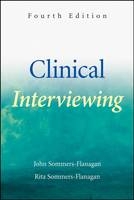
Clinical Interviewing
John Wiley & Sons Ltd (Verlag)
978-0-470-18359-5 (ISBN)
- Titel ist leider vergriffen;
keine Neuauflage - Artikel merken
JOHN SOMMERS-FLANAGAN has a PhD in clinical psychology and is Associate Professor of Counselor Education at the University of Montana. He serves as a psychological consultant with Trapper Creek Job Corps. His research interests include clinical interviewing, parent consultations, and adolescent psychotherapy. RITA SOMMERS-FLANAGAN earned her PhD at the University of Montana where she is now a Professor of Counselor Education. She provides mental health consultation at the Missoula Vet Center and Trapper Creek Job Corps. She has taught and written in the area of applied, practical ethics for the past fifteen years. John and Rita have coauthored seven books, including Becoming an Ethical Helping Professional: Cultural and Philosophical Foundations and Counseling and Psychotherapy Theories in Context and Practice: Skills, Strategies, and Techniques (both from Wiley).
Preface. Part One: Becoming a Mental Health Professional. Chapter 1 Introduction: Philosophy and Organization. Welcome to the Journey. Theoretical Orientations. Basic Requirements for Clinical Interviewers. Goals and Objectives of This Book. Summary. Suggested Readings and Resources. Chapter 2 Foundations and Preparations. Defining Clinical Interviewing. Self-Awareness. The Physical Setting. Professional and Ethical Issues. Summary. Suggested Readings and Resources. Part Two: Listening and Relationship Development. Chapter 3 Basic Attending, Listening, and Action Skills. Attending Behavior. Moving Beyond Attending. Nondirective Listening Responses. The Pull to Reassurance. Directive Listening Responses. Summary. Suggested Readings and Resources. Chapter 4 Directives: Questions and Action Skills. Using Questions. Directive Action Responses. Summary. Suggested Readings and Resources. Chapter 5 Theoretically-Supported and Evidence-Based Relationships in Clinical Interviewing. Carl Rogers's Core Conditions. Evidence-Based Psychoanalytic and Interpersonal Relationship Concepts. Evidence-Based Behavioral and Social Psychology Concepts. Evidence-Based Feminist Relationship Concepts. Evidence-Based Solution-Focused and Constructive Relationship Concepts. Summary. Suggested Readings and Resources. Part Three: Structuring and Assessment. Chapter 6 An Overview of the Interview Process. Structural Models. The Introduction. The Opening. The Body. Applying Interventions. The Closing. Termination. Summary. Suggested Readings and Resources. Chapter 7 Intake Interviewing and Report Writing. What Is an Intake Interview? Objectives of Intake Interviewing. Factors Affecting Intake Interview Procedures. Brief Intake Interviewing. The Intake Report. Summary. Suggested Readings and Resources. Chapter 8 The Mental Status Examination. Objectivity. What Is a Mental Status Examination? The Generic Mental Status Examination. When to Use Mental Status Examinations. Summary. Suggested Readings and Resources. Chapter 9 Suicide Assessment. Personal Reactions to Suicide. Suicide Statistics. Key Components in a State-of-the-Science Suicide Assessment Interview. Suicide Risk Factors and Suicide Risk Factor Assessment. Conducting a Thorough Suicide Assessment. Suicide Intervention. Professional Issues. Summary. Suggested Readings and Resources. Chapter 10 Diagnosis and Treatment Planning. Principles of Psychiatric Diagnosis. Diagnostic Assessment: Methods and Procedures. The Science of Clinical Interviewing: Diagnostic Reliability and Validity. A Balanced Approach to Conducting Diagnostic Clinical Interviews. Treatment Planning. An Integrated (Biopsychosocial) Approach to Treatment Planning. Summary. Suggested Readings and Resources. Part Four: Interviewing Special Populations. Chapter 11 Challenging Clients and Demanding Situations. Part One-Challenging Clients. Part Two-Demanding Situations. Summary. Suggested Readings and Resources. Chapter 12 Interviewing Young Clients. Special Considerations in Working with Children. The Introduction. The Opening. The Body. The Closing. Termination. Summary. Suggested Readings and Resources. Chapter 13 Principles and Tips for Interviewing Couples and Families. Some Ironies of Interviewing Couples and Families. Interviewing Stages and Tasks. Special Considerations. Summary. Suggested Readings and Resources. Chapter 14 Interviewing in a Diverse and Multicultural World. Relationship in the Context of Diversity. Four Large Worldviews. Other Diverse Client Populations. Cultural Complexities and Identities. Assessment and Culture-Bound Syndromes. Professional Considerations. Summary. Suggested Readings and Resources. References. Author Index. Subject Index.
| Erscheint lt. Verlag | 5.12.2008 |
|---|---|
| Verlagsort | Chichester |
| Sprache | englisch |
| Maße | 188 x 262 mm |
| Gewicht | 1036 g |
| Themenwelt | Geisteswissenschaften ► Psychologie ► Klinische Psychologie |
| ISBN-10 | 0-470-18359-4 / 0470183594 |
| ISBN-13 | 978-0-470-18359-5 / 9780470183595 |
| Zustand | Neuware |
| Haben Sie eine Frage zum Produkt? |
aus dem Bereich


